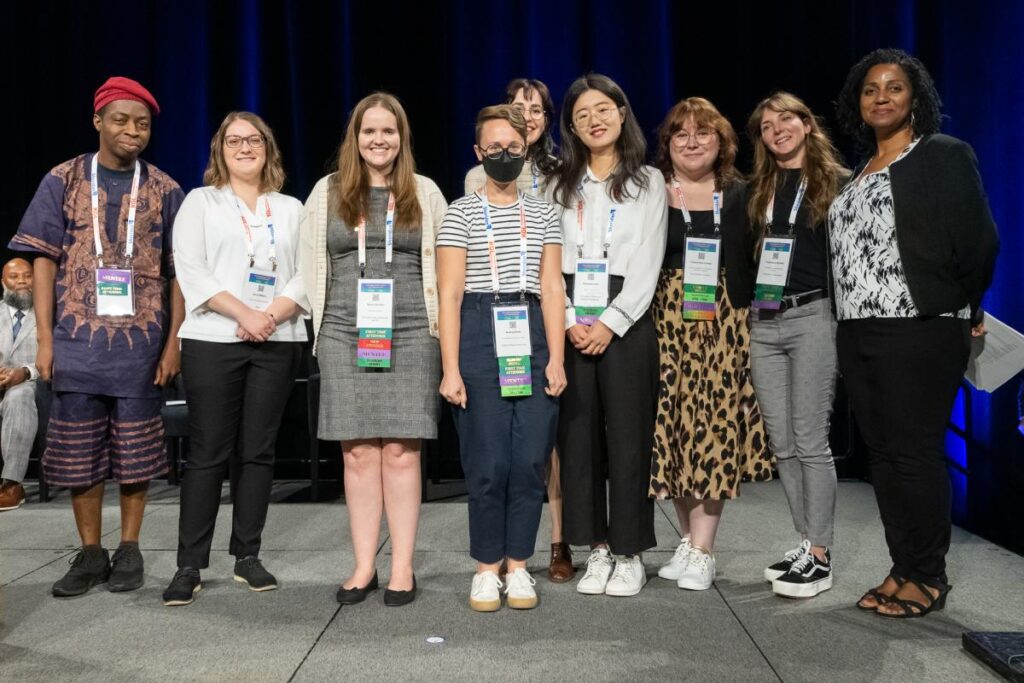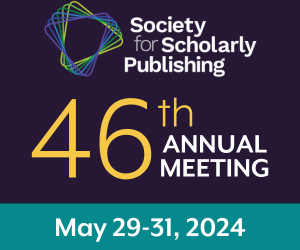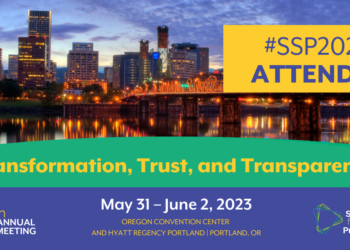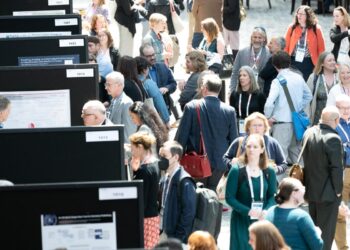Editor’s Note: Today’s bonus post is by Tim Lloyd, Erin Foley, and Jessie Slater, co-Chairs of the Society for Scholarly Publishing (SSP) Annual Meeting Program Committee. Tim is s founder and CEO of LibLynx, a company providing Identity, Access, and Analytics solutions for publishers and libraries. Erin is Director, Rightsholder Relations at Copyright Clearance Center (CCC). Jessie is a research and data analyst at Science magazine.
This year’s Society for Scholarly Publishing (SSP) annual meeting, Inflection Point: Setting the Course for the Future of Scholarly Communication promises to be one for the ages. How do we reckon with publishing and integrity at the intersection of science and society? Will we survive the rise of the machines and the AI-dominated future? Has the OA movement truly failed? We have lots of questions and hopefully a few answers in store for you this May in Boston. Registrations are far outstripping previous meetings for this point in time (including those in the pre-Covid before times), and there’s a buzz in the air about the program.

So, why are we so excited? Behind the scenes, we’ve been working over the last 9 months to re-engineer our program to include more new voices in our industry, and we can’t wait to share the results with you.
Inclusivity is one of our Society’s (and hopefully society’s) core values. We cannot meet the (fast) changing needs of scholarly publishing unless we benefit from the widest range of ideas and perspectives. Everyone has something to contribute, and can benefit personally and professionally from their membership in SSP.
This is particularly true of our high-profile annual meeting. It’s a place to learn and exchange ideas, to discuss and debate issues, and to network and make new friends. And all of this is more valuable when there are more of us involved.
With this in mind, we’ve made all facets of diversity, equity, inclusion, and accessibility (DEIA) a particular focus of our planning this year. We believe that our program for Boston offers the most diverse range of content and speakers of any annual meeting to date, which is one of the reasons that you should register now!
Submitting meeting proposals is real work. Submissions have to be tailored to the requirements of a specific meeting, often with overly complicated format requirements, and deadlines that are frequently months before most people are even thinking about attending the meeting itself. And this work has to be fitted around your day job, which may offer limited flexibility, leaving you to push this task into evenings or weekends (or to simply put it off altogether).
In every industry there is a core group of dedicated organizers that have honed their skills at crafting submissions, and leveraging their extensive networks, to deliver polished submissions that routinely get ranked above the rest. These organizers are invariably selected to present, and as a result, the networks they draw upon are often disproportionately represented onstage at meetings.
Our own review processes have, in prior years, helped support this inequity by historically favoring these organizers’ proposed sessions and their impressive rosters of diverse speakers, and creative plans for the delivery of information. Scoring rubrics that reward polished submissions have the inadvertent effect of boosting review scores for these practiced organizers. Whilst at the same time, these factors raise the barrier for newer, less-experienced organizers to compete (especially early career individuals who frequently lack the flexibility to invest time in submissions during their workday). In turn, these institutional barriers limit opportunities for a more diverse network of speakers and moderators to participate.
This year we sought to make the review process more equitable by focusing on the quality of the ideas presented, and not the wrapping around those ideas (i.e., speakers, interactivity, etc), to create a more level playing field for anyone with a good idea. We’ve also more actively promoted the importance of diversity in our published speaker guidelines, including a request for experienced, regular speakers to consider proposing and mentoring a less-experienced colleague to help increase panel diversity and build capacity in our community.
We’ve also strengthened the support available to the session organizers once their submission is selected. Through the existing ‘session shepherd’ role, program committee members will more actively help organizers to craft a successful session. Our large and diverse annual meeting program committee of 40+ members is a robust resource for identifying and suggesting new voices for the annual meeting.
Our approach is already bearing fruit and we believe this year’s program reflects a more diverse set of organizers and topics than in prior years.
Here are some of the other ways in which we’re focusing on inclusivity in planning our annual meeting:
- Like SSP as a whole we have worked to embrace DEIA in all of our efforts and that begins with working to increase the diversity of the Annual Meeting Program Committee. Inclusion starts at home, and this year’s meeting was planned by the most diverse committee membership we’ve ever seen. Committee members were selected to reflect a wide range of roles in scholarly publishing to include society and for-profit publishers, vendors, librarians, and researchers with experience ranging from early career positions to industry leaders. These members bring with them greater diversity in terms of the networks they can leverage to help us promote participation in the annual meeting at all stages from proposal submissions, to speaking roles, to attendance. We know we still have work to do to increase our geographical diversity and welcome volunteers from outside the US, Canada, and UK.
- In planning this year’s plenary sessions, we’ve intentionally sought participation from members of our community outside the usual suspects who speak on these topics. When we actively seek new voices, we can not only increase diversity in perspectives and representation, but also better reflect the experiences and views of those in our industry and the world we live in. We can only benefit from including more perspectives on the main stage and we hope to encourage more members of our society to add their voices to discussions within our industry.
- For the first time, we’ve appointed a dedicated curator for our virtual experience! David Turner (Data Conversion Laboratory) is a serial virtual attendee for industry meetings and brings a wealth of experience to the table in terms of what works, and perhaps more importantly, what doesn’t — when you’re participating in a conference through your laptop screen. We’re working with David to enhance virtual attendance by crafting a number of dedicated virtual experiences for the annual meeting that will create the sense of community that’s often missing as a virtual attendee.
- This year we’ve adopted recommendations from past attendees and SSP’s own DEIA committee and worked to promote accessibility in presentations. We are encouraging organizers and speakers to provide accessible presentation materials, from education sessions slides to posters. We are also working to collect these presentation materials in advance to upload to the Whova app to make them more accessible to both in-person and virtual attendees. Our information for speakers page now includes guidance on best practices for slides created in Google Slides and Powerpoint, as well as links to additional online resources on topics such as accessible fonts and inclusive language.
If you haven’t already done so, please register for this year’s annual meeting in Boston and experience the power of inclusivity to broaden and deepen our program. The Early Bird rate is available through to April 19!
Discussion
2 Thoughts on "Inclusivity is Making This Year’s SSP Annual Meeting Better than Ever"
I am so looking forward to the meeting! Well done!
At least in our company there is no transparency on who gets to attend such meetings. Only those in the know and having contacts get such opportunity. Inclusiveness begins with information fluidity and transparency. What’s the point when even attending such industry events need blessings from those on top?



